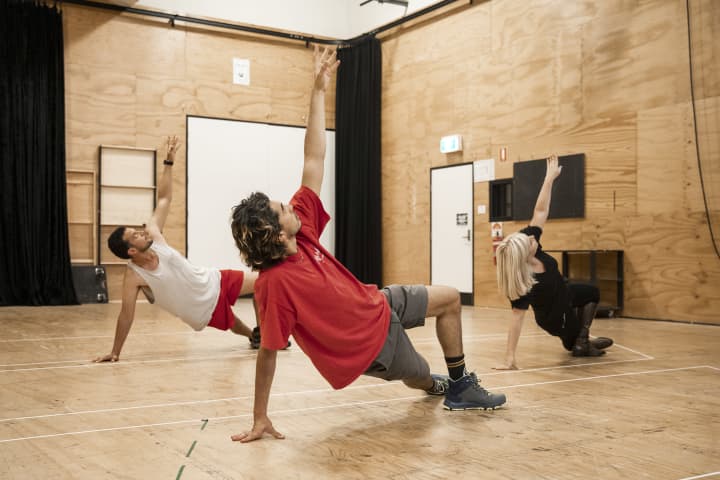With multiple books, countless essays and articles, and a multi-season TV show under his belt, writer Benjamin Law began 2020 enjoying the thrill and horror of watching his debut stage play, Torch the Place, premiere to sold-out houses following its development through MTC’s NEXT STAGE Writers’ Program.
How do you write a play?
That is a very good question, and I’m still not sure if I have the answer. But if Torch the Place can offer a case study at least, what I would say is that I came into the world of playwriting from television, which is a slightly backwards way of doing it.
In television one of the things I’ve learned is that it’s a collaborative process, usually from day one – sometimes even nutting out the concept is a collaborative process – but the actors are the last people you bring into that process. With playwriting, and this play at least, what I found was so much of the initial writing was done in private and then the very next step, as soon as I had a draft, was ‘oh let’s bring actors in.’ To me, that was just absolutely horrific because it’s not ready: it feels like you’re standing naked as you’re trying to find your wedding outfit and all of your guests are watching you change, but in the meantime they’re seeing every bit of your butt as you're trying to look as elegant as possible!
‘The horror of failure is so amplified and so much more deeply felt writing for the stage. I make it sound like a trauma experience, watching your own play unfold on opening night to the delight of others!’
As much as that’s exposing, that feeling of exposure is really good for the writing process because you can hear immediately when the comedy doesn’t land, when things don’t add up. Also, actors have this superpower: they inhabit the role by speaking the lines, but through inhabiting that role they can also tell you insights that you would have never thought about as a writer. Those lightbulb moments that they provide you with are so invaluable.

Benjamin Law enjoys a script reading of Torch the Place for MTC at MPavilion in 2018. Photo: Sarah Walker
Where do you get you inspiration from?
Whether it’s plays or TV shows or feature articles or essays or anything else I’m writing, often the ideas do tend to come from similar places:
- personal experience
- things that you just get weirdly obsessed by, things that are in the news cycle, feature articles that you’ve been reading...
For me, I get a lot of my ideas from conversations that can’t be resolved. Writing for me is a way of trying to make sense of a mess; when other people get frustrated by conversations that don’t seem to have a resolution, I get a little bit excited because I think ‘well, there’s something in that’. Why can't this idea be reconciled easily? Why does this argument make me feel uncomfortable? Why has this argument between people led me for the next five days to have an argument with myself? That’s when I know that there’s something interesting to be explored, because a play or a good story or a feature article should all do the same thing: it should unpack the complications of a story, rather than necessarily offering didactic, easy solutions to a complicated situation.
How do you write realistic dialogue?
Oh that’s such a good question. It’s hard, and I feel like there are some writers who are much better at it naturally than others. I tend to overwrite dialogue because I just find it fun, but it means that I have a bit of dialogue diarrhoea. But then I get my dialogue Imodium on and I realise that so much of the nuance, so much of the delivery, will come through the actor and you want to give them dialogue that’s rich but at the same time gives them the capacity to find something interesting that only they can provide.
‘When I’m revising dialogue for plays or TV scripts, I read it out loud. I sound absolutely bonkers, but I’m reading it out loud constantly.’
When writers start out – and this includes myself – one of the big things that is a challenge is making sure the characters don’t sound like each other. How people speak depends on their background, their class, their age, their cultural and racial background, whether they’ve had means or not, which part of the world or which part of the country they’re from.
One of the tricks that I often tell other writers or writing students is: if you can cover up who is speaking in a play at any given moment and you can’t distinguish between the characters, you definitely have a problem and you need to start addressing that. But the other thing is a very practical thing: when I’m revising dialogue for plays or TV scripts, I read it out loud. I sound absolutely bonkers, but I’m reading it out loud constantly.
How do you how do you write realistic characters?
Every writer’s process is different, but in television it’s very rare that you’d even write a word of dialogue before you have spent days, weeks, months, fleshing out who the character is. You do that in the writers’ room, trying to figure out who the character is: you discuss these people like real-life people; you’re bringing your own personal experiences to this character; you are figuring out what their backstory is. This might never come up in the show but it gives you a deeper understanding into who this character is so that by the time you’re writing their dialogue it should be a far easier task because you know every last detail about them and you know the idea that you want them to inhabit.
‘I’m about to sound like a sociopath but after spending so much time with them, I cannot wait to run away from them.’
For me, it was such a steep learning curve when I was working on The Family Law, which is the first TV show that I ever wrote, or co-wrote. There was this mantra, with my producers and my show runner, which was: character is king. No comedy will work, no one will buy the comedy, unless it comes from character. Plot has to come from character, comedy has to come from character. It’s all well and good to make a really funny joke but will the audience buy it? Is it consistent with the character’s psychology? So my approach is to spend so much time thinking about the character – how they operate in the real world, their private life versus their public life, their secrets, their shames – to know them so intimately that by the time you’re writing their lines it should be much clearer.
I realise I’m about to sound like a sociopath but after spending so much time with them, I cannot wait to run away from them. That’s not me saying that I don’t love them, that’s not me saying that I’ve spent too much time with them or anything like that. It’s because I feel like I’ve gotten so incredibly deep into who they are and the various sliding-door options that they could inhabit, and I’ve redrafted them so many times, that the exhaustion which happens as a result is usually the sign that the story is finished. When you don’t have anything else to offer these people that you’ve created, that’s a sign the story is done. It doesn’t mean I stop thinking about them or that I don’t hold them in fond regard because obviously they completely dominated my life to the point of obsession while I’ve been writing them. But then it’s usually healthy to say goodbye.

Ben Law with the Torch the Place cast (from left, Max Brown, Charles Wu, Fiona Choi, Michelle Lim Davison and Diana Lin) and director Dean Bryant; opening night, February 2020. Photo: Heath Warwick
What are the main challenges or differences between writing for the stage and writing for the screen or the page?
What I love about theatre is the element of risk: anything could go wrong on stage, and as the writer I feel that too. When writing for the page or writing the screen, you’re still a little bit removed from your reader or your audience; but writing for the stage, there’s nowhere to escape: you are the writer in this room, absorbing how people react to you. It’s the exhilarating thing about theatre but it’s also the intimidating thing.
TV has so many challenges that are specific to TV. TV is incredibly structured, especially if you’re writing for commercial audiences: three acts with commercial breaks timed almost mathematically. With a play, those parameters are far looser, to the point where you really do have a blank page, for better or worse. That’s the thrill of it and the horror!
On opening night of Torch the Place, it felt like I was having an out-of-body experience. The level of delight at seeing audiences be moved by the play and laughing at the comedy that we worked so hard to achieve was in constant battle with my deep anxiety and the horror that I could just feel every word burning into my skin. The horror of failure is so amplified and so much more deeply felt writing for the stage. I make it sound like a trauma experience, watching your own play unfold on opening night to the delight of others!
Have something to ask MTC? You can submit your question and in the coming weeks it might be yours that we answer.
Published on 27 October 2020





